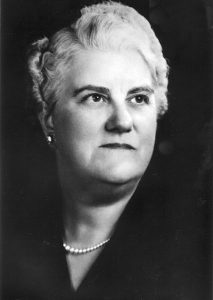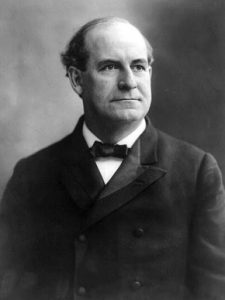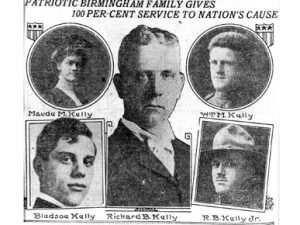Alabama’s First Woman Lawyer and a Pioneering Political Activist, Maud McLure Kelly
- October 30th, 2020
- by specialcollections
- in General

Maud McLure Kelly (1887-1973) was Alabama’s first woman lawyer and a pioneering political activist and archivist. Kelly was born on July 10, 1887, in Oxford in Calhoun County to Richard Bussey Kelly, a lawyer, and Leona Bledsoe Kelly. She graduated from Anniston’s Noble Institute, a primary and secondary school, in 1904, having absorbed her parents’ staunchly pro-Confederate, Democratic views. From an early age, Kelly was fascinated with law, and after the family moved to Birmingham in 1905, she read law in her father’s office. Two years later, Kelly entered the University of Alabama to study law formally. Although the school had opened its doors to women more than a decade earlier, Kelly was only its second female student. Well liked by her classmates (who called her “sister in law”), Kelly graduated third in her class in 1908. Nevertheless, had not John McDuffie, a law student and legislator, rewritten the bar admissions statute so that women could present credentials, Kelly might never have practiced in Alabama.
Kelly was admitted to the bar in October 1908 and opened a practice in Birmingham. Within a few years she was handling a variety of civil matters and criminal cases, including a lawsuit against the Alabama Coast Line Railroad for the killing of an African American child. She also assisted the state attorney in prosecuting a case. In 1914, after being nominated by famed attorney William Jennings Bryan, Kelly was admitted to the bar of the U.S. Supreme Court. Kelly was also politically conscious. She joined women’s historical, genealogical, and cultural societies.

An ardent suffragist, Kelly joined the Birmingham Equal Suffrage Association and participated in its campaign to give women the right to vote, serving on the executive council and the policy-making board. She also advocated for the poor and underserved. By 1919, when the Nineteenth Amendment was ratified and women were given the right to vote, Kelly had taken a post as a federal attorney with the U.S. Department of the Interior in Washington, D.C.

In addition to her work, Kelly volunteered to work with hospitalized veterans at Walter Reed Army Medical Center—an experience that would soon prove useful. In 1924, displeased with the scandal-ridden administration of Warren G. Harding and needed at home to care for her ailing father and two brothers wounded in World War I, she returned to Birmingham, where she resumed her practice, her professional associations (she was an officer in the Alabama Woman Lawyers Association), and her political interests. She stumped the state in 1928 for Democratic presidential candidate Al Smith, and in 1932 served as official host for the Alabama delegation to the Democratic National Convention.
Able to live off some wise investments, Kelly ended her legal practice in 1931 but continued to do civic work, notably for the American Legion Auxiliary. In 1943 Kelly accepted Alabama Department of Archives and History (ADAH) director Marie Bankhead Owen’s offer of the combined post of acquisitions agent, editor of the Alabama Historical Quarterly, and inspector of county records. In addition, Kelly authored legislation that gave ADAH authority over public records. Retiring in 1956, she continued to care for ailing family members and took up genealogy. Kelly died on April 2, 1973, and was buried in Anniston’s Hillside Cemetery. A devout Baptist, she donated her personal collection of genealogies, local histories, maps and other items to the Special Collections Department of the Samford University Library.
PMP
Additional Resources:
McDuffie, John. To Inquiring Friends If Any: Autobiography of John McDuffie, Farmer, Lawyer, Legislator, Judge, As Told to and Edited by Mary Margaret Flock. Mobile, Ala.: Azalea City Printers, 1970.
Newman, Cynthia. Maud McLure Kelly: Alabama’s First Woman Lawyer. Birmingham, Ala.: Birmingham Printing and Publishing Co., 1984.
Sallee, Shelley. The Whiteness of Child Labor Reform in the New South. Athens: University of Georgia Press, 2004.
Thomas, Mary Martha. The New Woman in Alabama: Social Reforms and Suffrage, 1890–1920. Tuscaloosa: University of Alabama Press, 1992.
